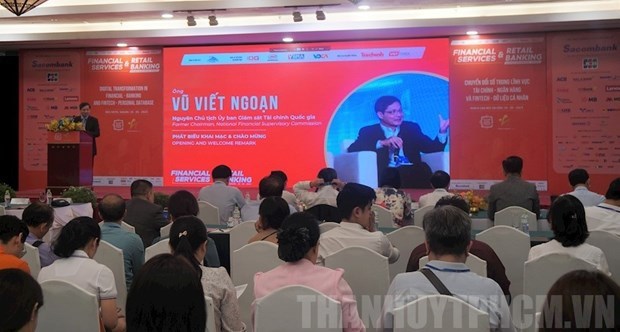HCM City aims to become fintech hub
Ho Chi Minh City hopes to become a financial technology hub (Fintech hub), a model similar to that of US Wall Street in New York city, according to Lam Dinh Thang, director of the municipal Department of Information and Communications.
Ho Chi Minh City hopes to become a financial technology hub (Fintech hub), a model similar to that of US Wall Street in New York city, according to Lam Dinh Thang, director of the municipal Department of Information and Communications.
Under the Politburo's Resolution No 31-NQ/TW on orientations and tasks for the development of HCM City by 2030, with a vision to 2045, HCM City will become a locomotive in terms of the digital economy and digital society. Specifically, the digital economy will account for 40% of its Gross Regional Domestic Product (GRDP) by 2030, Thang said at a seminar entitled “Digital transformation in financial-banking-fintech-personal database” held recently in the city.
To this end, the city has issued many policies, focusing on the development of science-technology and innovation, defining them as the two main driving forces to help the locality excel in the future, he said.
Accordingly, attention will be paid to developing key industries and promulgating many policies to support business development activities. HCM City will also continue to invest and effectively exploit technology incubation centres at universities, hi-tech parks and the Quang Trung Software Park to form a sustainable startup ecosystem.
The city has also implemented many important programmes and projects such as the digital transformation programme, a project on turning HCM City into a smart city and the one to support the development of businesses and information technology - communication products in the 2020-2030 period, he noted.
Defining 2023 as the year of "digital data", Thang said HCM City will focus on connecting, sharing, exploiting and analysing data for digital transformation. Therefore, a data governance strategy has been issued, focusing on three groups of data, namely those on land and urban areas; people's information and financial-business development. The strategy aims to unlock the potential of data to better serve the activities of municipal public agencies, provide more user-friendly and efficient services to local residents and increase labour productivity and innovation toward the comprehensive and sustainable development of the digital economy.
The promotion of digital transformation is increasingly popular in many provinces and cities as well as ministries and agencies as an indispensable requirement in the development process, experts said.
According to Vu Viet Ngoan, former Chairman of the National Financial Supervisory Commission, Vietnam has made rapid changes in the digitisation of databases, creating a new source of energy for businesses, especially those in the financial and banking sectors.
He predicted that the wave of digital transformation will continue to take place strongly in the banking and finance sector, adding that most banks have carried out a digital transformation programme. The development of technology poses challenges to banks in terms of customer experience requirements, but it is also a driving force for the banking industry, Ngoan said./.










